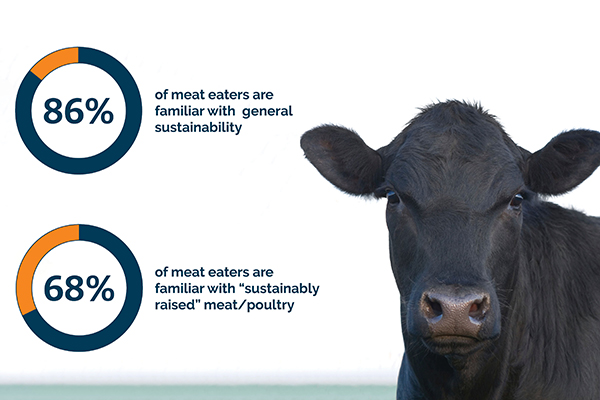Consumers need our help to eliminate confusion about sustainability
Sustainability – it’s a big word with a multitude of meanings. We’ve been hearing about this topic for years as major companies have begun developing and implementing sustainability goals and programs. Consumers are seeing it more as companies and brands promote their sustainability messages on package. Over the past 22 months, there have been headlines shouting that the meat industry as a whole is “unsustainable” despite the fact that we’ve said for years that farmers and ranchers are the “original environmentalists.” What more do we need to do to continue to meet consumer demand? Where do we start?
Last month, the National Institute for Animal Agriculture’s (NIAA) board of directors took a key step by adding a Sustainability Council to the areas of focus for the organization. As a leader in animal agriculture, the board felt it was imperative to provide members with educational opportunities and updates about this increasingly important industry topic. Look for more information on the new council soon.
So, the question still remains – how does the animal agriculture community best communicate the sustainability message to an audience outside our industry circles? What does the consumer want from those who provide the food and fiber they rely on daily?
In July, our team at Midan Marketing took on this topic to find out how consumers perceive sustainability when they shop for meat products (beef/pork). What we found was enlightening in that it clearly defined the areas where we need to communicate and tell our story. Let me share a few insights we learned:
- 86% of meat eaters are “somewhat” or “very” familiar with the term sustainability. College educated and younger consumers are especially tuned in to the general concept of sustainability.
- 21% of meat eaters think about sustainability a great deal.

Today, about half of meat consumers equate sustainably raised meat with how animals are raised and treated. The topics meat consumers assume to be addressed by “sustainably raised” meat are animals raised without antibiotics or hormones and animal welfare. It’s not surprising that consumers link how animals are raised with sustainability as some of our team’s previous research has shown consumers often lean toward meat choices that are “better for me, better for the animal and better for the environment.”
With 57% of meat consumers ranking “animals raised without antibiotics/hormones” as the most important “sustainable-related” attribute, it’s easy to see that education can play a key role in helping consumers see the benefits of sustainable animal agriculture.
The how and where to start can sometimes be overwhelming and block us from taking action. We have to move from a defensive stance to one of proactive messaging. Understanding how consumers relate to sustainably raised meat and starting the conversation on their terms is key to moving the conversation forward.
This content originally appeared in the National Institute of Animal Agriculture’s member-only newsletter Paradigm.


